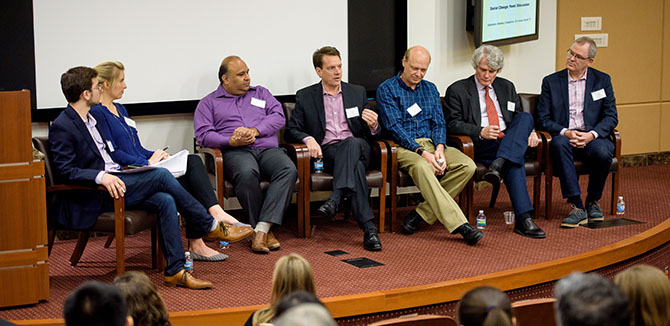Industry Leaders Discuss Innovations with Analytics to Create Social Change at the 2016 Analytics Exchange
Speakers from SocialDeviant, University of Chicago, Inmar, AMA, the City of Chicago, Civis Analytics, and Capgemini discuss how analytics can be used to promote social change and increase awareness
Inspiring and innovative ideas arose when industry leaders came together to consider how analytics can make significant changes to the world.
Greg Green, project lead of performance marketing, strategy, analytics, and insight at SocialDeviant, began the discussion by considering the impact of social media as a means of social change. Green discussed ways that brands can improve a message or campaign to have a positive effect on society.
“If the brand is truly grounded in purpose, if that authenticity is there and it intersects with what other people have as a purpose, then magic starts to happen with that authenticity and purpose,” Green stated. “You don’t have to just get lucky. You can engineer content that matters to change the world.”
For Rayid Ghani, director of the Center of Data Science and Public Policy at the University of Chicago, the aspiration to change the world means making use of the expanding capabilities of analytics to predict and prevent social problems. Ghani discussed the issues of police brutality, high school student retention, and lead poisoning as problems that could be prevented by using the tools that data scientists already have available.
Green and Ghani were two of the many industry leaders who weighed in on the theme of “Analytics for Social Change and Human Resources” during the 2016 Analytics Exchange on Monday, May 16. The fourth annual event, hosted by McCormick’s Master of Science in Analytics program, brought together MSiA students, alumni, and industry partners to Northwestern University’s Chicago campus to discuss the importance of using data to create a positive social change.
Greg Kerr, chief technology officer and executive vice president at Inmar, and Jeff Clouse, director of data science at Inmar, discussed the use of data to improve healthcare and wellness, particularly in patient adherence to prescriptions and treatment. Clouse and Kerr explained ways that better adherence is linked to better outcomes and lower costs, and how patient data can lead to increased engagement from doctors and pharmacies to improve overall health and wellness.
Greg Wozniak of the American Medical Association continued the conversation about using healthcare data for quality improvement, stating that accountability for adherence to medical treatment is shared by the patient, the clinician, and the health care system.
In addition to presentations from industry partners, current Master of Science in Analytics students were given the opportunity to showcase their project work. The two student groups collaborating with Allstate and with Pace discussed the use of data to improve driver safety and ways to optimize the experience of public transportation for Chicago riders, respectively. During these year-long practicum projects, MSiA students gain practical experience by analyzing data to create innovative business solutions that can be implemented by the company and provide business value.
During the afternoon session, Dan Jennis, project lead of human capital management consulting services at Capgemini shifted focus to the increasing opportunities with analytics in human resources and workforce planning. Jennis spoke about the various techniques for human resources analytics, from contextualized text analytics to machine learning to predictive analytics.
Dr. Ed Malthouse, co-chair of the Analytics Exchange and professor at Northwestern University, spoke of the inspiring connections between the themes of the day during his concluding remarks.
“I was very encouraged to hear about all the focus on early detection of problems,” said Malthouse. “I think we saw that time and time again, from predicting when citizens are in danger of police brutality to improving food inspections to anticipating if a client will remain on track with medical treatment. I think that is a very promising field: to deploy our analytical systems to prevent a problem before it occurs.”
The 2016 Analytics Exchange offered unique perspectives on how analytics can be used in a variety of situations to affect social change and to create a better world. From using social media as a social change platform to finding innovative ways to use analytics to improve the workplace, attendees gained insight into the increasing value of analytics across platforms.


